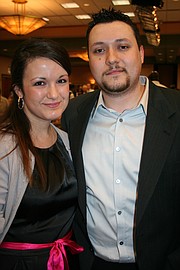UNITED NATIONS (AP) - Israelis and Palestinians dug into positions that have bedeviled negotiations for years, a troubling prelude to the expected showdown over Palestinian statehood at the United Nations on Friday.
The United States has been spearheading international efforts to defuse the Palestinians' plan to ask the U.N. Security Council to recognize an independent Palestinian state encompassing the Israeli-occupied West Bank and east Jerusalem, and the Gaza Strip, ruled by Palestinian Hamas militants.
International mediators have argued that only through negotiations, and not by international dictates, can this most intractable of Mideast conflicts be resolved. But the hardened positions augured ill for the prospect of talks resuming any time soon.
But Palestinian President Mahmoud Abbas has rebuffed all efforts to sway him from the statehood bid and said he would submit the application to U.N. chief Ban Ki-moon on Friday as planned. A top aide, Mohammed Ishtayeh, said Abbas has asked Ban and the Council's Lebanese president this month to process the application without delay.
His willingness to risk a threatened U.S. veto in the Council has given a big boost to his popularity at home, reflecting the deep exasperation of the Palestinian people after 44 years of Israeli occupation - and a deep distrust of Washington, which the Palestinians view as biased toward Israel.
An Israeli official, speaking on condition of anonymity to discuss diplomacy, said there was no talk about halting Jewish settlement construction on lands the Palestinians claim for a future state. A senior Palestinian official insisted the Palestinians would not return to the bargaining table without assurances Israel would halt settlement building and drop its opposition to basing negotiations on the borders it held before capturing the West Bank, east Jerusalem and the Gaza in 1967.
"We made lots of concessions over the years. It's time the Israelis make the concessions," Nabil Shaath, a top aide to Abbas, told the Associated Press.
Another senior Abbas aide, Azzam Ahmed, ruled out a New York meeting between Abbas and Israeli Prime Minister Benjamin Netanyahu, who had proposed the two sit down together on the sidelines of the U.N. General Assembly session this week.
At last year's General Assembly meeting, President Barack Obama eloquently expressed his hope of seeing a Palestinian state by now. But talks meant to produce that state broke down last September after three short weeks, after an Israeli moratorium on new settlement construction expired.
The Palestinians, deeply skeptical of Israeli Prime Minister Benjamin Netanyahu's commitment to peacemaking, changed tack. They decided to reinvigorate their flagging statehood campaign by bringing it to the broadest possible international forum - the United Nations - in the hope an enhanced world status would pressure Israel to act more boldly.
Netanyahu insists his commitment to peacemaking is genuine and accuses the Palestinians of going to the U.N. specifically to avoid negotiations.
In recent weeks, international mediators have been furiously trying to piece together a formula that would let the Palestinians abandon their plan to ask the Security Council for full U.N. membership, and instead make do with the more modest goal of asking a sympathetic General Assembly to elevate their status from permanent observer to nonmember observer state. The other part of that formula would include the resumption of negotiations in short order.
The U.S. and Israel were also pressuring council members to either vote against the plan or abstain when it comes up for a vote. The vote would require the support of nine of the council's 15 members to pass, but even if the Palestinians could line up that backing, a U.S. veto is assured.

